- Home
- Brand, Max
Mountain Riders Page 3
Mountain Riders Read online
Page 3
“I went to a country school three days a week, for three or four whole winters,” said Derry. “And I picked up a lot of facts on the street and on the bum and before the mast. You know how it is. I got through a lot of grades, but it’s the sort of a school that you never graduate from.”
“I know.” Rainey smiled as he lighted his cigar and began to smoke it tenderly. “But you use good English. How does that happen?”
“I sailed a couple of years,” said Derry, “with a red-nosed, hard-handed, whisky soak as skipper of the ship. He was a Yankee and he’d been through all sorts of colleges. He used to go on a binge two or three times a week, unless we were lying off the Horn or making land, and the day after he’d had a bust, he was pretty shaky. The only thing that quieted him down and rubbed the edges off his sharp nerves was reading aloud. He picked me for the job. A lot of times when the rest of the boys were washing decks, or making sail, or doing any of the kind of dirt that comes your way at sea, the skipper would have me in his cabin reading to him. And every time I mispronounced a word, he’d put me right. And if I mispronounced the same word twice, he’d be apt to get up and come for me. He was six-feet-something and two hundred pounds of hell. He used to beat me to a pulp until I learned how to box from fighting him.”
“A hard way to learn,” said Rainey, smiling.
“A fast way, and a good way,” answered Derry. “A right hook that knocks you flat every time it socks you is a punch that you learn to block. The skipper’s jaw was so hard that I broke my hand the first time I hit it. That taught me how to grip my hands. You can knock the edge off a block of stone, if you hold your hands right.”
“What became of the skipper?” asked Rainey.
“Oh, it’s a long story. He rode the men so long that they threw him over the side into a boat, one day, and they threw me after him, and we lived on rain-water and fish, now and then, for thirty days before we made land. And the skipper was so tired of water that when we made port, he went on a ten-day binge that finished him. I planted him down there in Valparaiso and came north again.”
Rainey nodded. He took out a wallet and from it counted out a stack of bills. He pushed the money out to Derry.
“That’s twenty-five thousand dollars,” he said. “Maybe you can get to Old Man Cary, and maybe you can buy him for less than that amount. If you can, you’ll get a cut of what you save.”
Derry took the sheaf of bills and smoothed them carefully. He sighed. A little shudder ran through him.
“I’m not worrying,” said Rainey. “That stuff will be safe with you. It’s going to be all right.”
Derry grinned. “It’s going to be tough to go straight where you’re sending me,” he said. “But I’ll see what I can do for you. When do I start?”
“Now,” said Rainey. “I’ll take you as far along the way as I can.”
5
ANOTHER DEBT
THEY spent that day and most of the next riding steadily north and west through the foothills, through the lower mountains, and the second afternoon they came down a long gully with a bit of a town stuck in the middle of it.
“It’s getting close to Blue Water,” said Rainey. It’s getting so close that it may be a bad chance for me to try to ride through that town down there. But we waste two or three hours if we cut around it.”
“You mean to say that if the people spot you, they’ll open up with guns?” asked Derry. “Isn’t there any law up here?”
“There’s no law in the Blue Waters,” said Rainey. He waved his hand towards the great sweep of the mountains. “Nothing but hawks and eagles fly this high,” he explained, “and the same crook who put Barry Christian in jail knows how to get the crooks and the roughs on his side. In every prison in the United States, the lifers and the long-termers talk about this hole-in-the-wall and try to get here if they can make a break. No wonder Jim Silver is able to build up a following!”
“I’ve got a feeling,” said Tom Derry, “that my grip would just fit snug around his throat.”
But Rainey said, shaking his head: “Never you mix with Jim Silver. He’s as big as your Yankee skipper, and he’s a lot faster and stronger.”
“You never saw that skipper,” said Derry.
“And you never saw Silver. The difference between him and other men is the difference between a hundred-and-fifty-pound dog and a hundred-and-fifty-pound cat. I’ve seen him dissolve three big, hard-handed roughs like three spoonfuls of sugar in a cup of tea. No, no, don’t be that ambitious. Don’t mix with Jim Silver!”
Derry sighed and nodded again.
“All right,” he said. “I won’t mix with him then. What does he look like?”
“He’s easily spotted. He carries himself like a king. By his head and his big shoulders you can spot him, for one thing, and if he takes off his hat, you’ll see a couple of tufts of silver-grey hair over the temples, like horns that are beginning to sprout. But don’t ask questions about him. You’ll find that nine-tenths of these crooks, up here, believe in Silver. He’s paid for that belief. And if you ask questions of them, they’ll start asking questions of you.”
“I’ll keep my mouth shut,” said Derry. “It seems sort of queer, though. That’s all.”
“The Blue Waters are the home of queer things,” said Rainey. “But we’ll ride down the valley here and see if we can slip through the town.”
They rode down the gorge, therefore, dipping out of the sunlight into the warm shadow that filled the ravine, and so they came into the little town that sprawled its unpainted shacks right and left of the trail as carelessly as any town in all the casual West.
They came to the general merchandise store, where the usual line of loungers were tilted back in their chairs, sleepy-looking men with cigarettes drawling out of the corners of their unshaven lips. They were almost past when there was a loud Indian yell, and then:
“Get ’em boys! It’s Buck Rainey! Get ’em!”
Buck Rainey flattened himself along the back of his mount, and the black went away like the wind.
The mustang of Tom Derry, however, had no mind to run until a rifle bullet clipped off the top of one ear. Then it went away like mad, and Derry, looking back, saw the pursuit sweeping after him — three, four, a dozen riders in varying groups as they managed to scramble out of houses and into saddles, roused by the yelling that echoed up and down the street, and the roaring of gun-fire.
Derry was not three jumps up the winding trail beyond the town, with Rainey out of sight before him, and only a hanging ghost of dust to show where the long-legged black mare had vanished, before it was clear that there were better animals, by far, in the pursuit, than the bronco under Derry’s saddle.
Left or right, there was no place to dodge. He could hear the creaking of the saddle leather right behind him.
“Don’t shoot that hombre!” called a commanding voice, horribly close behind him. “Rope him, Mike! He’s easy!”
Then a rifle cracked out of the brush at the bending of the trail. The bullets whipped past the head of Derry. He glanced back and saw that no saddle behind him had been emptied, but that the men of the village were leaping their horses right and left to get out of the storm of lead.
Turning the corner at high speed, he saw Buck Rainey turning the black mare and putting his rifle back into its holster.
“That’s the second time you’ve saved my hide!” shouted Tom Derry. “I won’t forget!”
He saw Rainey wave a hand that banished the subject to a region of unimportance. Well, it was not unimportant to Tom Derry.
They were out of the ravine, now, taking a down grade that gave the wretched little mustang longer legs and a chance to get its wind. Derry could think, and it was only of one thing. Twice to owe his life, and to one man, was a staggering thing. He glanced across to the other and saw Rainey sitting the stride of the black mare magnificently, guiding the creature with the mere grip of his knees while his rapid hands refilled the magazine of his repeating rifle. And
a passion came up in Derry to pay back the debt he owed to this man. If only the way could be shown to him — if only the chance would come!
It came fast enough!
They were swinging, now, across a wide tableland, a high plateau that was pushed up among the mountains, and the hunt was regathering rapidly behind them.
“Go on by yourself!” shouted Derry. “You can get away, all right. Don’t tie yourself down to me. I’ll — I’ll dodge them. Here, take the money — and that black mare will blow you away from them!”
He offered the sheaf of money. The wind got at it and rattled it loudly in his fingers.
“Keep it!” called Rainey. “Both or nothing, Tom. That’s our motto!”
And this with the rifle bullets beginning to whistle once more through the air. But the miserable little bronco could not or would not improve its speed. And there was Rainey, keeping back his tall black within the range of trouble!
Then came the crash. The big black mare reared, leaped and then tried to bolt. She pulled away to a little distance before Derry saw the blood that streaked down her quarters. The animal had been hit and was bleeding fast Their greatest source of strength had become weakness now.
Disaster followed before he could take breath. Rainey jerked aside in his saddle; when Derry pulled up to him, his whole right leg was being soaked with blood. He had been shot through the thigh, and it looked as though the bullet had nipped an artery.
“Go on,” called Rainey. “They’ve stung me, and I’ve got to turn and fight them. Go on — for Barry Christian — understand? Go on to the Carys’. I’ll stay here and cover you so — ”
“Damn the running!” shouted Derry. “Both of us or neither of us. Make for the rocks there!”
A nest of rocks crowned a low hill on the left. Rainey, nodding, swung the black mare straight for it and let her sprint on a loosened rein, while he whipped out his rifle and opened fire on the pursuit. In spite of the fact that the black mare was galloping hard and jouncing her rider, the bullets of Rainey flew close enough to the mark to make the other riders scatter to either side. Two or three of them pulled up short and threw themselves down on the ground to reply to that running fire from a secure rest.
Before they could shoot, the two fugitives were among the rocks, big Rainey slewing around out of the saddle and sinking to the ground. It was not in Derry’s mind to remain there, however. He simply whipped out of his saddle and into Rainey’s.
“Take the bronc. Ride on out of the way after I’ve pulled the gang off the trail. I’ll come back — ”
He flung those words over his shoulder as he started the wounded mare into frantic speed once more, and he heard Rainey shouting:
“Come back here! Don’t be a fool! The mare’s bleeding to death! Come back! They’ll run you down!”
Well, that was all right. Already Rainey had twice saved his life, and a glory of hot pleasure came over Derry as he sprinted the black mare away from the rocks and across the plateau.
His ruse worked well enough. The pursuit had not closed in very far and in the slant dazzle of the late afternoon sun, they were recognizing a horse, not a rider. Just as Derry had hoped, every one of those riders swung away after the black mare.
They had to make a detour, at that, for the rifleman in the rocks had opened fire to assist his partner, and the enemy was forced to swing away on a long slant before they could straighten out after the mare.
The black, poor thing, was in pain and fear enough to distend her nostrils and madden her eyes, but still she put all her heart into her work. The mare was a splendid mount, with a mouth of silk and the gait of flowing water. If she ran so well, she could surely jump a little, also.
And that might be important, for the whole face of the plateau, here, was criss-crossed by shallow little ravines that had been cut down by rivulets that ran only in the season of the rains. It was like a miniature of a complete river system, the water courses deeply incised. Derry tried the mare at a twelve-foot ditch of that sort. The black flew it without trouble!
And suddenly Derry shouted with delight, for he could see the golden chance before him. All of those little ravines, of course, flowed along in one general direction, and in that direction he and Rainey had been fleeing. Now he turned his course and drove the mare right across the narrow of the valley. One little gulch after another opened up before him, and one after another the long-legged mare flew like a bird.
Derry looked back, and now he laughed out of a free and happy heart, for already the majority of the pursuers were struggling up and down across the little ravines. Only a single pair of riders could imitate the flying course of the black. Then, in turn, those leaders were gone. Like all the rest, they had to strain their horses up and down the steep sides of the gulches. It would take them half an hour to do what the mare could wing across in five minutes.
It seemed to take them even longer. In a mere breathing space they were dropped far behind. And a little later, Tom Derry had turned into a clump of woods and was working furiously over the bleeding wound of the mare. With water from a rivulet he washed the wound. With strips of the saddle blanket he bound in place a clean bandage of a newly laundered bandanna. And as the bleeding stopped, he sat down on a rock and eyed the mare, and saw her knees trembling with weakness or with fear, and watched the agony of fright go out of her big eyes. She came close to him. She would not graze more than a few yards from him. And when the wind came with a rush through the trees, she snorted and limped quickly to his side.
Derry rubbed her nose, and looked at the sunset colours which were stretching around the horizon, seen by glimpses among the trunks of the trees. By this time, he judged, a disappointed set of riders had given up their man-hunt and were jogging down the home trail.
So he ventured out and led the lagging mare straight across country to the rocks. It was starlight when he reached them and found, of course, no sign of Rainey.
But even by scratching matches he was able to pick up a horse trail away from the rocks. It pointed toward a clump of trees a mere half mile from the rocks. But when he gained the grove and shouted, the voice of Rainey answered at once.
Derry halted, for the pleasure that he felt ran through his mind as a sweet taste runs through the tongue and the palate. A moment later he was in a little clearing among the trees and found there a bit of a fire, and Rainey calmly toasting bacon over the blaze!
“You’re a cool devil, you are!” Derry said.
“No,” answered Rainey. “The thick of the trees is enough to keep this fire from being seen from outside the wood. My leg’s too bad for any more riding, for a few days. They might as well catch me here as anywhere. And why not surrender with a full stomach instead of an empty one?”
Derry pointed to the rifle and the two revolvers that were laid out on the grass.
“There wouldn’t have been any surrendering,” he suggested.
“Oh, I don’t know,” answered Rainey. “How far did the boys follow you after you started the mare jumping the gulches? And how did you know she was a jumper?”
“She had the lift in her gallop,” said Derry, “so I tried her, and found she could walk on air. Those fellows? Oh, they gave up pretty soon. What’s the name of this mare?”
“Nell,” said Rainey.
“Well,” said Derry, “she’s as game as anything that ever talked with a tongue.”
“She simply does her bit,” said Rainey calmly. It was as though he were speaking lightly of virtues found in his own family circle. “Sit down and eat. You can hear the water running, over there. Fill the pot for coffee, will you?”
“Before I take a look at the hole that’s drilled through your leg?” asked Derry.
“That? Oh, that’s all right I’ve dressed it as well as a doctor could. And if the germs stay out and the blood stays in, I’ll be riding again in a week. It’s only through the flesh.”
Derry went down to the creek and filled the pot with water. As he came back, he was
walking slowly, for it seemed to him that he had entered a new life — that everything he had done before that had been as nothing, and that he never before had found a real man — not even that hardy Yankee skipper, so handy with fists and tongue.
As he reached the fire, he suddenly extended his hand. Rainey took it with an almost hesitant gesture and, looking up, smiled into the face of Derry. And Rainey had the look, at that moment, of a very happy but rather guilty boy.
6
CARY VALLEY
DERRY slept five hours on the flat of his back, as a sailor or a cowpuncher knows how to do. Then he wakened, saddled his mustang, patted the neck of Nell in farewell, and shook hands with Rainey. He parted quickly from the camp and took the way which Rainey had pointed out toward Cary Valley. There were still hours of darkness before him. He climbed with the horse through lonely valleys where the water sang loud or soft or came at him with rushings, like the wind. It seemed, sometimes, that if he turned aside to climb the slope of one of the mountains, he would be able to touch the stars when he gained the peak.
Those mountains were turning black, and the grey of the morning had commenced when he reached the wall of Cary Valley. As Rainey had suggested, he did not try to enter the valley by means of one of the gorges that pierced the wall of cliffs, for in the throat of such a valley he was fairly sure to encounter one of the clan, curious as children and cruel as Indians. Instead, he tethered his horse among trees near a place where he could descend the wall of cliffs, but on the edge of the rock he waited for a time while the light of the morning increased.
A land mist rose off the level like steam, as the dawn commenced. Through it, the clumps of the trees rose as dark islands. Finally, he could see the house itself, in the midst of the largest of those islands of woods. Then, the mist thinning out, the sparkle of creeks began to glimmer up to him. Last of all, he could see the grazing herds, spotted singly or in groups over that rich grazing land.

 Alcatraz
Alcatraz the Long, Long Trail (1923)
the Long, Long Trail (1923)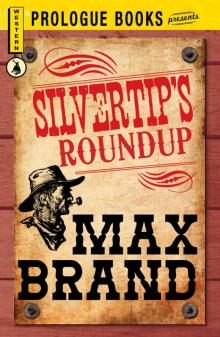 Silvertip's Roundup
Silvertip's Roundup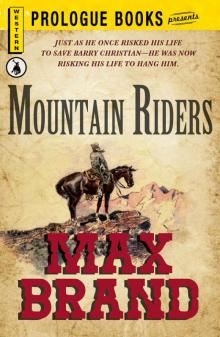 Mountain Riders
Mountain Riders Silvertip (1942)
Silvertip (1942)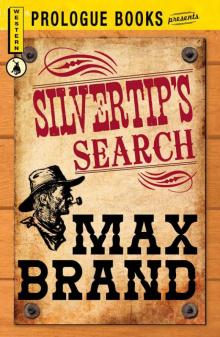 Silvertip's Search
Silvertip's Search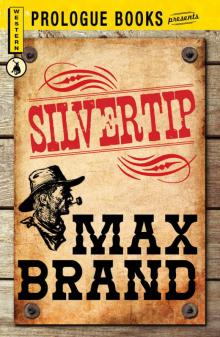 Silvertip
Silvertip Bull Hunter
Bull Hunter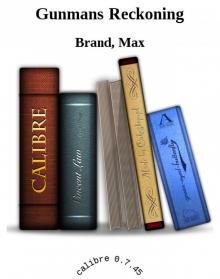 Gunmans Reckoning
Gunmans Reckoning The Seventh Man
The Seventh Man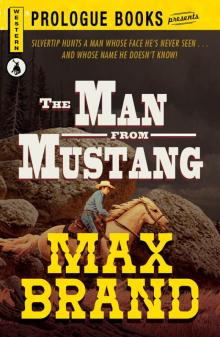 Man From Mustang
Man From Mustang Riders of the Silences
Riders of the Silences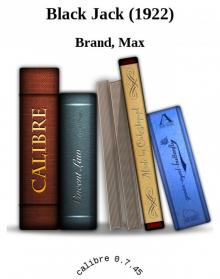 Black Jack (1922)
Black Jack (1922) Way of the Lawless
Way of the Lawless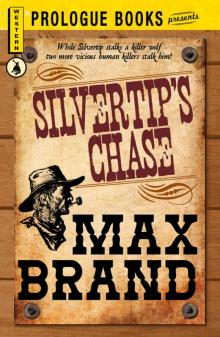 Silvertip's Chase
Silvertip's Chase Trailin
Trailin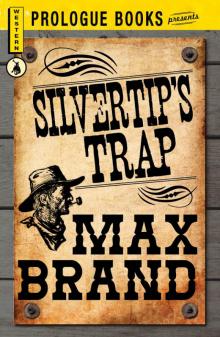 Silvertip's Trap
Silvertip's Trap Ronicky Doone (1921)
Ronicky Doone (1921) The Night Horseman
The Night Horseman the Garden Of Eden (1963)
the Garden Of Eden (1963)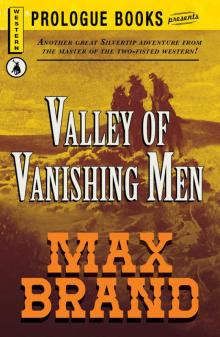 Valley of the Vanishing Men
Valley of the Vanishing Men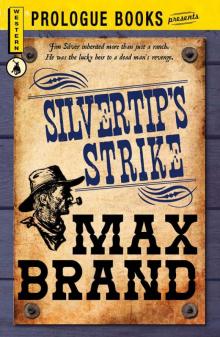 Silvertip's Strike
Silvertip's Strike Black Jack
Black Jack the Untamed (1919)
the Untamed (1919) Way Of the Lawless (1921)
Way Of the Lawless (1921) The Untamed
The Untamed